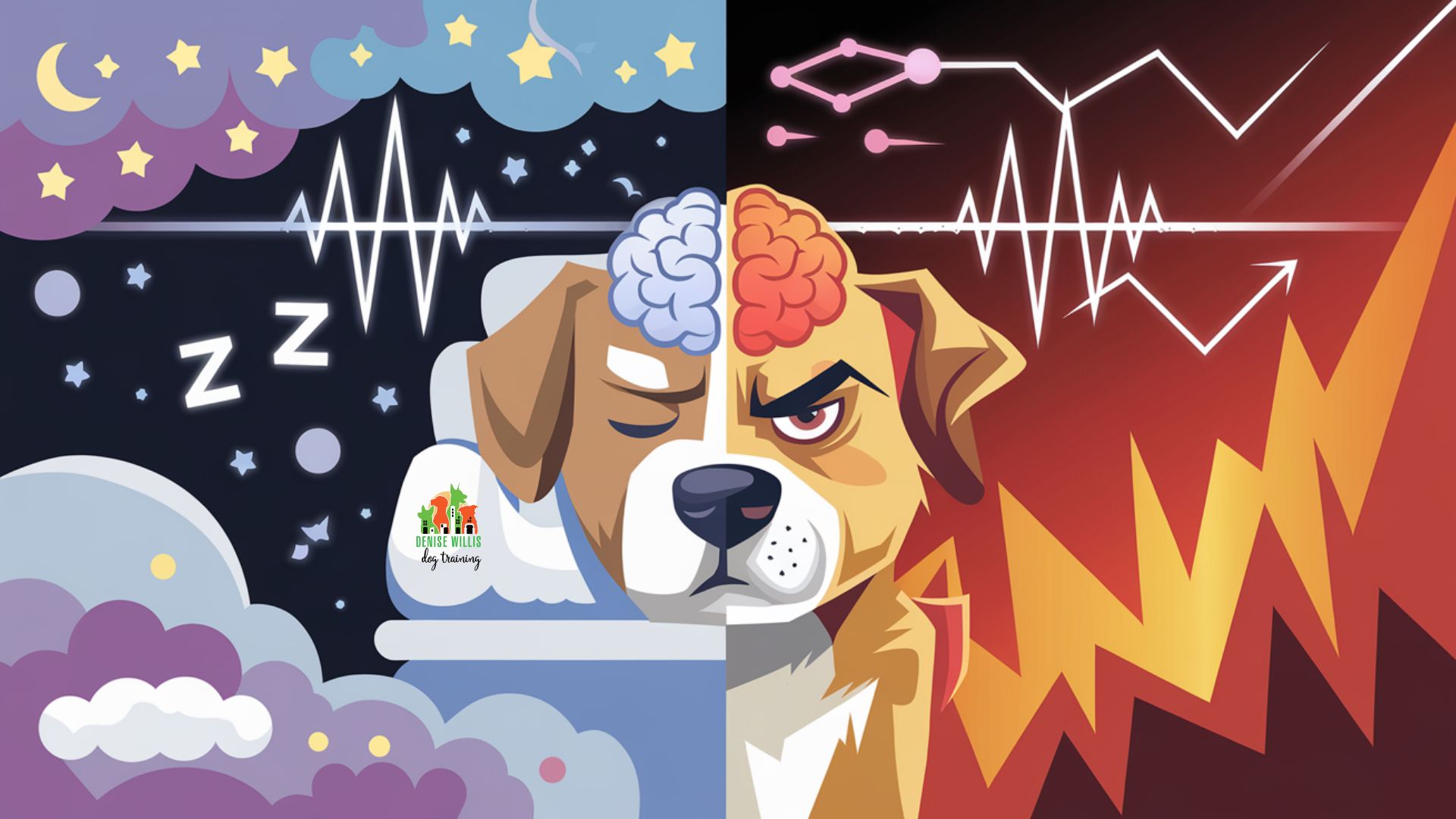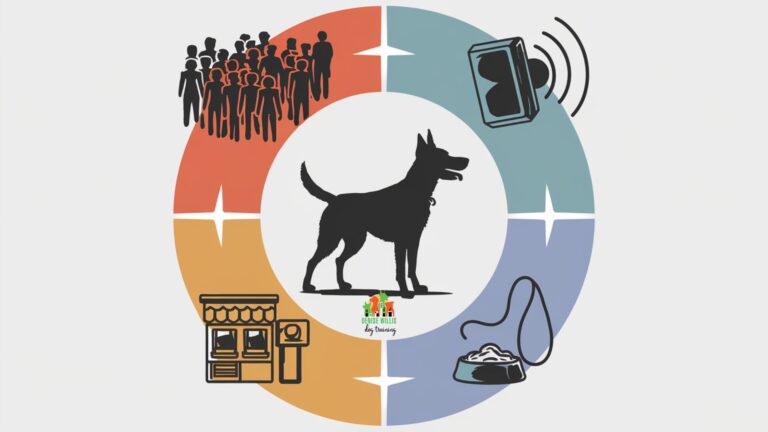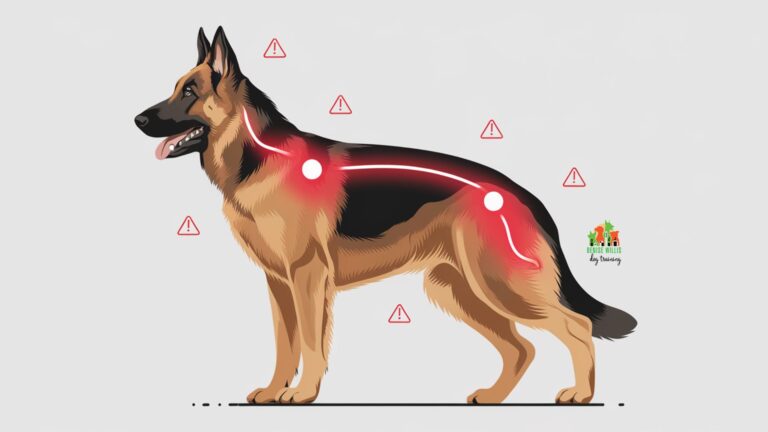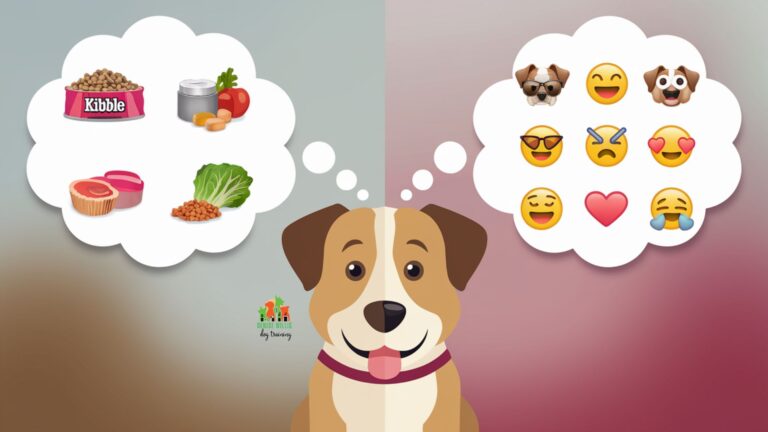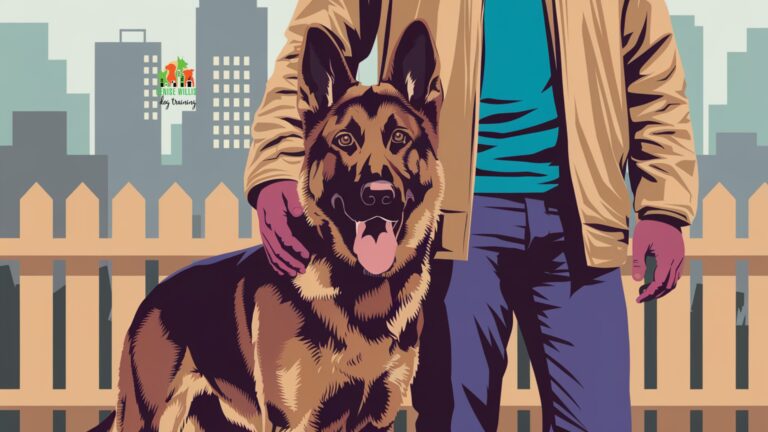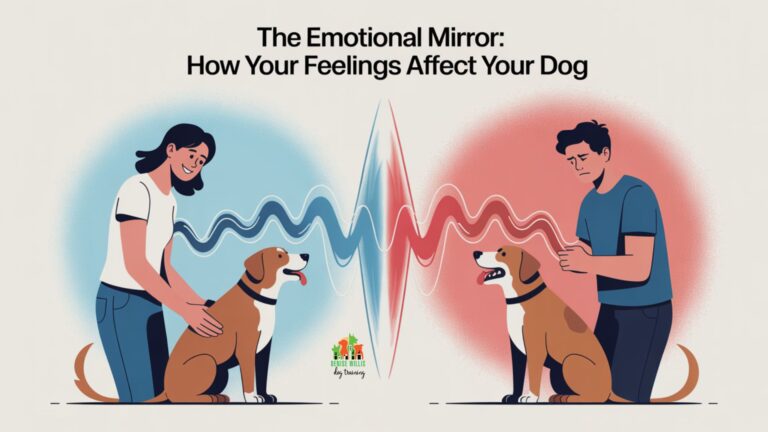Sweet Dreams: The Unexpected Connection Between Dog Aggression And Sleep Patterns
📍 Service Area Notice: DW Dog Training provides in-person training services exclusively in the Greater Baltimore area. While our blog content is designed to help dog owners internationally, our hands-on training services are locally focused. For readers outside our service area, we hope you find value in our articles and welcome you to reach out with questions!
Your dog just growled at your houseguest for the third time this week.
You’ve tried everything – training sessions, calming treats, even that fancy collar the pet store clerk swore would fix everything. But what if the solution isn’t another training technique or gadget?
What if your dog just needs a good night’s sleep?
The surprising relationship between dog aggression and sleep patterns is gaining attention from both researchers and dog trainers alike. Much like how humans turn into grumpy monsters after an all-nighter, dogs undergo similar – and sometimes more dramatic – behavioral changes when they’re sleep-deprived.
Key Takeaways
- Sleep deprivation significantly impacts dogs’ emotional regulation and impulse control
- Dogs typically need 10-12 hours of sleep daily, with puppies and seniors requiring more
- Common signs of sleep deprivation include excessive yawning, irritability, and heightened reactivity
- The sleep startle reflex can trigger seemingly unprovoked aggressive responses when dogs are awakened suddenly
- Creating consistent sleep routines and comfortable sleep environments can reduce aggression in many dogs
The Sleep-Aggression Connection in Dogs
Sleep Needs
Dogs require 10-12 hours of quality sleep daily. Puppies and seniors may need up to 18 hours for proper brain function and emotional regulation.
Warning Signs
Sleep-deprived dogs show excessive yawning, droopy eyelids, increased sensitivity to noise, and shorter fuses before aggression triggers.
Sleep Environment
Create a quiet, comfortable sleeping area away from household traffic. Consistent bedtime routines signal to your dog’s brain that it’s time to wind down.
Neurological Impact
Sleep deprivation reduces serotonin while increasing stress hormones, creating a biological recipe for heightened aggression and reactivity.
The Science of Canine Sleep
Dogs aren’t just cute when they’re sleeping. They’re doing critical biological maintenance. Research shows that dogs typically follow a diurnal circadian rhythm similar to humans, being active during the day and sleeping primarily at night. On average, adult dogs need about 10-12 hours of quality sleep over a 24-hour period, with puppies and seniors often requiring more.
Unlike humans, who generally sleep in one consolidated block, dogs are more flexible sleepers. They cycle through shorter sleep-wake periods throughout the day and night. This evolutionary pattern stems from their ancestors’ need to remain alert to potential threats – something your dog still practices when they snap awake at the sound of a delivery truck three blocks away.
During sleep, dogs cycle through stages, including drowsiness, light sleep, deep sleep, and REM (rapid eye movement) sleep. That twitching and “chasing rabbits” behavior happens during REM, when your dog’s brain is processing information and consolidating memories.
Yes, including that time you accidentally stepped on their tail three years ago.
How Sleep Deprivation Affects Canine Behavior
Ever notice how your toddler nephew becomes a tiny terrorist when he misses naptime?
Dogs experience a similar emotional collapse when sleep-deprived, except they have sharper teeth and no use for reasoning.
Studies indicate that sleep-deprived dogs show increased irritability, reduced impulse control, and heightened stress responses – essentially all the ingredients for a perfect aggression cocktail. The connection isn’t mysterious: without adequate sleep, the brain’s emotional regulation centers can’t function properly.
When your dog snaps at another dog for simply existing nearby, it might not be a training failure. It could be their sleep-deprived brain overreacting to a stimulus they’d normally handle with more composure. The threshold for triggering an aggressive response drops dramatically in tired dogs.
Research from neurophysiology has found that sleep deprivation increases stress hormone production while decreasing serotonin levels, creating the biological equivalent of waking up on the wrong side of the bed, every single day.
The Numbers Don’t Lie: Sleep’s Impact on Dog Behavior
Ever wonder if scientists actually study dog sleep patterns, or if trainers are just making this stuff up to sell you fancy dog beds? Well, grab your reading glasses and prepare to be vindicated. The data is in, and it’s fascinating.
| Sleep Factor | Statistic | Behavioral Impact | Source |
|---|---|---|---|
| Sleep Deprivation | < 6 hours | Significantly increased severity of problem behaviors, including aggression | [Study] |
| Sleep Duration Sweet Spot | 8-10 hours | Optimal range associated with fewest behavioral problems | [Study] |
| Sleep Disturbance | 88% | Percentage of easily-disturbed sleepers showing increased aggression | [Research] |
| Age-Related Sleep Changes | 16 weeks vs. 12 months | Younger dogs sleep more during day, less at night; affects behavior regulation | [Study] |
| Gender Differences | Male > Female | Male dogs show more pronounced behavioral effects from sleep fragmentation | [Research] |
The numbers speak volumes, don’t they?
When researchers actually measured what happens to dogs who don’t get enough quality sleep, they found exactly what dog parents witness at home: cranky, reactive pups with hair-trigger tempers. Science has basically confirmed what you already knew. Your dog isn’t being dramatic when they get grumpy after a night of disrupted sleep. They’re experiencing a legitimate neurobiological response that alters their behavior regulation capabilities.
Recognizing Signs of Sleep Deprivation in Dogs
Your dog can’t exactly text you “feeling exhausted today, might bite later,” so recognizing the subtle signs of sleep deprivation falls on your shoulders. Fortunately, tired dogs tell us they’re struggling in several ways:
Physical Indicators:
- Excessive yawning and droopy eyelids (beyond normal tiredness)
- Dark circles under the eyes
- Glassy-eyed stare
- Slower response times
Behavioral Red Flags:
- Reluctance to engage in previously enjoyed activities
- Heightened startle response
- Increased sensitivity to noise and environmental changes
- Strange bursts of hyperactivity followed by crashing
- Excessive clinginess or unexpected independence
The most concerning sleep-deprivation symptom is often a shorter fuse. Your normally tolerant retriever might suddenly growl when approached during meals, or your friendly pit mix might decide the mail carrier is public enemy number one. Behavioral experts note that these seemingly random aggression spikes frequently correlate with disrupted sleep patterns.
The Sleep Startle Reflex: A Special Consideration
Imagine you’re deeply asleep, dreaming about something pleasant, when suddenly someone shakes you awake. Your instant reaction isn’t gentle curiosity. It’s more like panicked confusion. Dogs experience this phenomenon too, but their startle response sometimes includes teeth.
Sleep startle reflex, sometimes called sleep aggression, causes dogs to snap or bite when awakened suddenly. This reflex isn’t calculated aggression. It’s a neurological response that bypasses the thinking brain. Your dog isn’t being “bad”; their ancient survival mechanisms kicked in before their modern “good dog” training could intervene.
Research suggests this reflex is more common in dogs from shelter backgrounds or those with trauma histories, possibly because sleep represents vulnerability in previously unsafe environments. However, any dog can experience sleep startle, particularly when exhausted.
Prevention is straightforward but crucial: never abruptly wake a sleeping dog, especially by touching them. Instead, call their name softly from a distance or make gentle noises nearby until they wake naturally. Teaching children this approach is particularly important for household safety.
Creating an Optimal Sleep Environment for Your Dog
Just like humans need the right conditions for quality sleep, dogs have environmental preferences that promote better rest. Creating a sleep sanctuary for your canine might be the single most effective aggression prevention tool in your arsenal.
- Location Matters: Pick a quiet corner away from household traffic and noise. Some dogs prefer den-like enclosed spaces that feel secure, while others want a spot where they can keep an eye on family activities even while resting.
- Comfort Is Key: Invest in appropriate bedding based on your dog’s preferences and needs. Those orthopedic beds aren’t just marketing—they make a significant difference for older dogs or those with joint issues who otherwise wake frequently from discomfort.
- Temperature Control: Dogs are sensitive to temperature disruptions. Pet health research shows that overheating or being too cold frequently interrupts sleep cycles, leading to poor quality rest even when the total hours seem adequate.
- Sound Management: White noise machines can mask disruptive sounds for sensitive sleepers. For dogs with noise phobias, creating a soundproofed sleeping area might be necessary to prevent chronic sleep disruption.
- The Great Co-Sleeping Debate: Should your dog sleep in your bed? The answer depends on several factors. Studies show that some dogs sleep more soundly with their humans nearby, while others get better rest alone. If your dog has shown any signs of sleep aggression, separate sleeping arrangements are safer for everyone.
Sleep-Focused Solutions for Aggression Management
If you suspect sleep issues are contributing to your dog’s aggression, consider these strategies:
- Establish Consistent Sleep Routines: Dogs thrive on predictability. Creating consistent bedtime rituals signals to your dog’s brain that it’s time to wind down. This might include a short evening walk, a quiet play session, or a specific bedtime treat.
- Respect Natural Rhythms: Observe when your dog naturally gets sleepy and try to accommodate those patterns. Forcing a dog to stay awake when they’re tired, like keeping them up during a party, is asking for behavioral trouble.
- Recognize Sleep Debt: If your dog has accumulated sleep debt from disruptions like travel, visitors, or environmental changes, plan for recovery days with minimal stimulation and maximum sleep opportunity.
- Manage Exercise Timing: High-intensity activity too close to bedtime can make it harder for dogs to settle, just as it does for humans. Activity planning research suggests scheduling vigorous exercise at least a few hours before intended sleep times.
- Consider Medical Factors: Sometimes, sleep disruption has underlying medical causes like pain, thyroid issues, or cognitive dysfunction. Veterinary sleep specialists recommend a thorough health check if sleep problems persist despite environmental adjustments.
- Professional Intervention: For serious aggression issues, working with a certified dog behaviorist who understands the sleep-behavior connection is crucial. They can develop personalized protocols that address both the aggression symptoms and the underlying sleep causes.
Product Recommendations
Shopping for a sleep-deprived, cranky canine is like buying pajamas for a toddler who thinks bedtime is a conspiracy theory. Here are some products that might help your four-legged insomniac catch those much-needed Z’s before they decide your mailman is public enemy number one.
- ThunderShirt Classic Dog Anxiety Jacket: Like a warm hug in fabric form, this pressure wrap helps calm anxious dogs who think sleep is optional. The gentle, constant pressure works like magic for many dogs with nighttime anxiety. Warning: Your dog may start expecting you to tuck them in with a bedtime story after experiencing this level of comfort.
- KONG Classic Dog Toy: The Swiss Army knife of dog toys doubles as the perfect pre-bedtime activity. Fill it with treats or peanut butter to engage your dog’s brain before bedtime, helping them wind down naturally. Caution: Your dog may develop such strong positive associations with bedtime that they start dragging you to the bedroom at 7 PM sharp.
- Zesty Paws Calming Bites for Dogs: These calming treats contain L-Theanine and chamomile to help soothe your sharp-toothed sleep terrorist into a peaceful slumber. They’re like melatonin gummies for dogs, but without the weird dreams. Warning: May cause your dog to become so relaxed they forget their sworn vendetta against the vacuum cleaner.
- Outward Hound Nina Ottosson Dog Brick Puzzle Toy: Mental stimulation is key to healthy sleep patterns, and this puzzle toy delivers it in spades. It’s like “Doggy Mensa: The Home Game” – perfect for tiring out that busy brain before bedtime. Caution: Your dog may become so intellectually stimulated they start questioning your authority and reading Nietzsche.
- Zuke’s Mini Naturals Training Dog Treats: Perfect for rewarding good bedtime behavior, these tiny treats won’t interfere with sleep by overloading your dog’s digestive system. They’re like little edible gold stars for your canine student of sleep. Warning: Your dog may start expecting these for achievements like “successfully closed eyes for five seconds” or “almost considered lying down.”
Remember, no product is a magic pill for sleep issues, but the right combination of tools can help establish healthy sleep routines. Your dog’s journey from cranky, sleep-deprived terror to well-rested angel may take time, but with consistency (and maybe a ThunderShirt), those sweet dreams are within reach.
Further Reading
Think you’ve graduated from Sleep and Aggression 101?
There’s still a Ph.D.’s worth of knowledge waiting for you! Expand your canine sleep expertise with these articles that dig deeper into the complex world of dog behavior. No caffeine is required. These reads are stimulating enough.
- Environmental Triggers for Dog Aggression: Discover how your home environment might be secretly sabotaging your dog’s sleep quality. This article reveals the hidden connections between physical surroundings and stress responses. Spoiler alert: That flashing router light in your dog’s sleeping area might be the villainous mastermind behind their grumpiness.
- Stress-Induced Dog Aggression: Stress and sleep are the ultimate frenemies. This guide breaks down how chronic stress creates a vicious cycle of sleep disruption and aggressive behavior. Find out if your dog is caught in this exhausting merry-go-round before they start stress-eating your favorite shoes.
- How to Manage Your Dog’s Territorial Aggression: Is your dog declaring martial law over their sleeping space? This article helps you negotiate peace treaties for bedtime territory disputes. Learn diplomatic solutions before your dog starts charging rent for sitting on “their” couch.
- 5 Proven Strategies to Stop Your Dog’s Aggression Towards Other Dogs: Sleep deprivation doesn’t just affect how your dog treats humans – it transforms dog park playmates into sworn enemies. Discover how improving sleep can restore your dog’s social skills before they’re permanently banned from the canine cocktail circuit.
- Dog Aggression Solutions: A Complete Guide to Stopping Aggressive Behavior in Dogs: The comprehensive playbook for addressing aggression through multiple approaches, including the sleep connection. It’s like the Encyclopedia Britannica of dog aggression, but much more entertaining and with fewer paper cuts.
Don’t hit the snooze button on expanding your knowledge!
These reads are your next steps toward becoming the dog sleep expert your friends will be begging for advice. Because nothing impresses at dinner parties quite like explaining the neurobiological connection between REM sleep and resource guarding in Labradoodles. (Results may vary.)
Test Your Knowledge: Sleep and Dog Aggression
Frequently Asked Questions About Sleep and Dog Aggression
Q: How much sleep should my dog be getting?
A: Adult dogs typically need 10-12 hours of sleep daily, while puppies and senior dogs may require 14-18 hours. However, individual needs vary based on breed, age, and activity level.
Q: Can anxiety cause both sleep problems and aggression in dogs?
A: Yes, anxiety frequently disrupts sleep quality while simultaneously lowering the threshold for aggressive responses. This creates a challenging cycle where poor sleep increases anxiety, which further reduces sleep quality.
Q: My dog sleeps all day. Isn't that enough?
A: Daytime napping is normal for dogs, but it doesn't necessarily indicate good sleep quality. Sleep fragmentation (frequent interruptions) prevents dogs from completing vital deep sleep cycles, resulting in sleep deprivation despite adequate time spent resting.
Q: Are certain breeds more prone to sleep-related aggression?
A: While individual temperament matters more than breed, some research suggests that breeds with higher vigilance drives may be more susceptible to sleep disruption and the resulting behavioral impacts.
Q: How long does it take to see improvement in aggression after fixing sleep issues?
A: Some dogs show improvement within days of establishing better sleep routines, while others may take weeks to resolve accumulated sleep debt. Consistency is key to seeing lasting changes.
Final Thoughts: The Importance of Sweet Dreams
The connection between sleep and aggression reminds us that our dogs aren't just furry robots who can function optimally regardless of their physical needs. They're complex biological beings whose behavior reflects their internal state, including their sleep quality.
By recognizing and addressing sleep needs, we often solve behavioral problems without elaborate training protocols or medications. Sometimes, the simplest answer really is the correct one: your dog needs more sleep.
For professional guidance on managing dog aggression through improved sleep quality and other evidence-based approaches, DW Dog Training offers personalized consultations that address the root causes of behavioral issues.
Because sometimes the path to a better-behaved dog starts with letting sleeping dogs lie - comfortably and for long enough.

